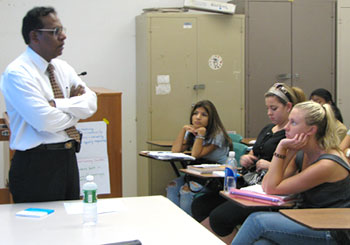2007 Distinguished Guest Speakers
Dr. Victor Karunan
On Oct. 3, 2007, Victor Karunan, of the Chief Adolescent Development and Participation (ADAP) Division of Policy and Practice, UNICEF Headquarters, visited the Children's Studies class, Perspectives on Childhood, taught by Professor Gertrud Lenzer. He discussed the work of UNICEF and, more specifically, the ADAP.

Karunan discussed how there is a "conceptual confusion" in categorizing "children," "adolescents," "youth" and "young people," and that different organizations and different countries have their own definitions. He explained that for the purpose of categorizing and statistical data, adolescents are divided into four groups or stages: Pre-Adolescence (10–13 years of age), Early Adolescence (10–12), Middle Adolescence (12–14) and Late Adolescence (14–19). Almost three billion people — nearly half the world's population — are under 25 years of age.
Karunan included in his presentation factual data to help the students and faculty attending the lecture "conceptualize" the information on adolescents:
- There is currently the largest cohort of adolescents in history.
- Every year 100 million children become adolescents.
- Between 300 and 500 million adolescents do not attend school.
- Approximately 73 million adolescents between the ages of 10 and 14 years of age work.
- Each day, approximately 6,000 young people become infected with HIV/AIDS — 2.4 million a year.
UNICEF's mandate to implement the Convention on the Rights of the Child necessitates that all children under 18 are included in its programming. The ADAP was established in November 2001. Its main goal is to reach the most disadvantaged and marginalized adolescents, and to protect their rights in the most urgent situations and emergencies. Adolescents are a large, sensitive and active group, and their meaningful participation contributes to democracy and good governance. "Ignored," Karunan stated, "they turn to negative behavior and activities. Inequity and disparity leads to insecurity, culminating in gang violence and involvement in armed conflict."
UNICEF is committed to building partnerships that promote meaningful participation of children and adolescents in programs and decision-making processes. UNICEF seeks to ensure that the views of girls and boys are taken into account in the design, planning, implementation and evaluation of policies and programs that affect their lives. Participation enables adolescents to make a significant contribution to their families, communities and society as a whole. This includes the areas of heath, education policy development, protection and HIV/AIDS.
Karunan highlighted several of the programs involving adolescents, including the Junior 8 Summit and Voices of Youth. The Junior 8 Summit seeks to establish a permanent secretariat on "Child Participation in Global Advocacy." The Junior 8 adolescent participants met world leaders from the G8 Summit to express their concerns and ideas for improving conditions in the world for children and youth. Voices of Youth is an interactive website for youth to learn how they can get involved. There are more than one million members worldwide.
In recent years, many countries have begun to work with adolescents as well as support the development of national and regional youth organizations and networks.
Children's Studies faculty also attended Karunan's lecture and actively participated in the question and answer period.






